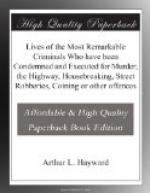He went directly into the London Road, and came as far as Tyburn, the sight of which filled him with so much terror that he was not able to pick up courage enough to go by it. Returning back into the road again, he met a waggon, which, in hopes of preventing all suspicion, he undertook to drive up to town (the man who drove it having hurt his leg). But he had not gone far before the persons who were in pursuit of the murderer of Sarah Goldington (the maid before mentioned) came up with him, and enquired whether he had seen anybody pass by his waggon who looked suspicious, or was likely to have committed the fact. This enquiry put him into so much confusion that he was scarce able to make an answer, which occasioned their looking at him more narrowly and thereby discovering the sleeve of his shirt to be all bloody. At first he affirmed with great confidence that a soldier meeting him upon the road had insulted him, and that in fighting with him he had made the soldier’s mouth bleed, which had so stained his shirt. But in a little time perceiving this excuse would not prevail, but that they were resolved to carry him back, he fell into a violent agony and confessed the fact.
At the next sessions at the Old Bailey he was convicted, and after receiving sentence of death, endeavoured all he could to comfort and compose himself during the time he lay under condemnation. His father, who was a very honest industrious man came to see him, and after he was gone Matthew spoke with great concern of an expression which his father had made use of, viz., That if he had been to die for any other offence, he would have made all the interest and friends he could to have served for his life, but that the murder he had committed was so cruel, that he thought that nothing could atone for it but his blood. The inhumanity and cruel circumstances of it did indeed in some degree affect this malefactor himself, but he seemed much more disturbed with the apprehension of being hanged in chains, a thing which from the weakness of vulgar minds terrifies more than death itself, and the use of which I confess I do not see, since it serves only to render the poor wretches uneasy in their last moments, and instead of making suitable impressions on the minds of the spectators, affords a pretence for servants and other young persons to idle away their time in going to see the body so exposed on a gibbet.
At the place of execution, Clark was extremely careful to inform the people that he was so far from having any malice against the woman whom he murdered that he really had a love for her. A report, too, of his having designed to sell the young girl he had brought out of the country into Virginia had weight enough with him to occasion his solemn denying of it at the tree, though he acknowledged at the same time that he had resolved to leave her. He declared also, to prevent any aspersions on some young men who had been his companions, that no person was ever present with, or privy to any of the robberies he had committed; and having thus far discharged his conscience, he suffered on the 28th of July, 1721, in the twenty-fourth year of his age.




